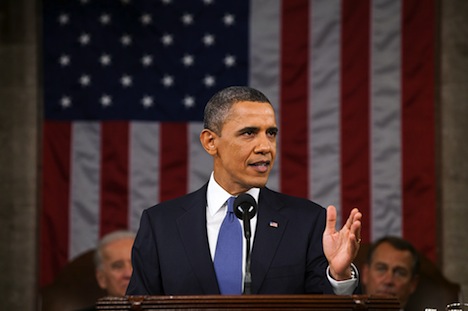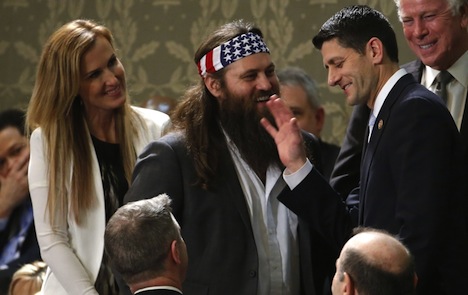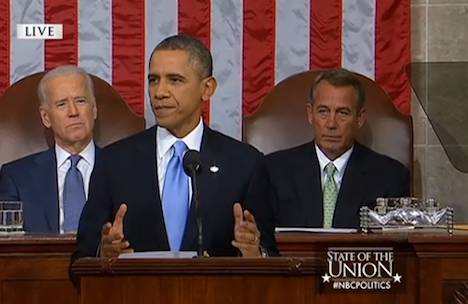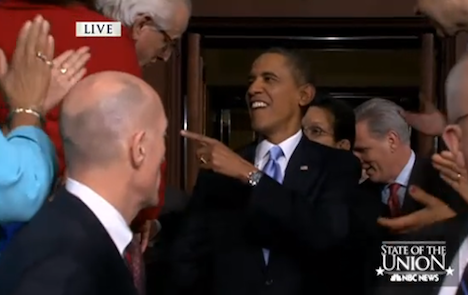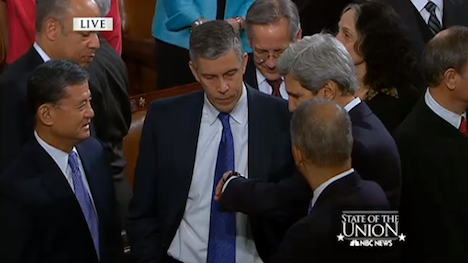Though the traditional State of the Union address from the US president always focuses more on domestic policy than foreign policy, that doesn’t mean that it won’t have an impact on world politics.![]()
In some cases, domestic policy (like immigration, drug policy or cybersecurity) has a pronounced effect on other counties throughout the world. In other cases, US presidents have used the State of the Union address to outline key decisions on foreign policy — in 2002, US president George W. Bush declared Iran, Iraq and North Korea as the ‘axis of evil,’ and in 2013, US president Barack Obama declared that the US war in Afghanistan would come to a close by the end of 2014. So the State of the Union can often be pivotal moments in US foreign policy as well.
Moreover, there’s no shortage of global hot spots that Obama may choose to address this year — Iran, Syria, the Arab world, Afghanistan, trans-Atlantic trade, trans-Pacific trade and so on.
Please join me at 9:00 ET for a Suffragio live blog that focuses on Obama’s 2014 State of the Union address — and what his speech means for world politics in the year ahead.
* * * * *
A few final thoughts. Overall, Obama covered very little new ground this evening. That’s true for domestic politics (myRA aside), but especially so with respect to foreign policy.
The 2014 State of the Union is not going to be remembered for the foreign policy bombshells of, say, the 2002 and the 2013 SOTU. Aside from the bold assertion aptly comparing today’s negotiations with Iran to the Reagan-era negotiations with the Soviet Union, it’s hard to find much imagination in the foreign policy checklist that felt tacked on to the end of the speech like a list of unwanted chores. At this rate, the Senate majority leader, Harry Reid, plans to bring up the new Iran sanctions veto in, oh, about… never. Taken together with the strong Obama veto threat tonight, I think it’s pretty clear that a long-term deal with Iran won’t crumble because of a handful of grandstanding US senators.
But otherwise, there was very little vision on foreign policy. Hardly any mention of China, certainly no mention of India or Latin America (aside from immigration). No mention of the global fight against HIV/AIDS. Only the most bare-bones references to TTIP and TPP, which makes me wonder how much of a priority those two trade deals are in the Obama administration this year. No dwelling on Syria or Egypt, which is understandable, I guess, given the government’s fumbles over those two countries over the past 12 months. But only the briefest acknowledgment of the potential damage that drone strikes and NSA surveillance could wreak on US foreign policy interest.
I expected much more from the speech on immigration reform, given that it’s the one policy area where Republicans and Democrats seem close to a breakthrough. When critics (fairly and unfairly) attack this president in particular for a deficit of leadership, this is exactly what they’re talking about. I was expecting to hear a much more forceful, if bipartisan, message on immigration reform, and unless Obama and House Republicans are putting the final touches on an immigration bill behind the scenes, it feels like a missed opportunity for advancing smart policy that a majority of Republicans and Democrats support.
It’s probably not popular to say it, but I found the Cory Remsburg tribute rather cynical. I know presidents have been rolling out ‘everyday heroes’ in the State of the Union address for decades. Remsburg’s recovery is nothing short of tremendous, and it’s a really heartwarming story. But it might have been better policy for Remsburg — and all of those like him who haven’t been used as photo ops for a presidential address — to not perpetuate what’s now a 13-year war in Afghanistan. I’m not even sure what point Obama was trying to make — that ‘America has never come easy,’ I guess, and some other glittering generalities. Again, it’s a bit unfair to pick on Obama, because all presidents since Reagan have done this, but it felt a bit cheap to me.
Ultimately, the best line from the 2014 SOTU will probably be the bizarre threat that US representative Michael Grimm of New York made against a reporter in the Capitol, that he would break the reporter ‘in half, like a boy.’
* * * *
10:21. And that’s a wrap!
10:16. There’s nothing like some good old-fashioned ‘U! S! A!’ chants at a SOTU address as Obama mentions the upcoming Winter Olympics, set to begin in Sochi in just 10 days. Bilateral relations with Russia remain strained over many issues, including its decision to grant asylum to Edward Snowden, its increasingly hard line against LGBT rights, growing authoritarianism under president Vladimir Putin and what the United States sees as unwarranted meddling in Ukraine and elsewhere in eastern Europe (though Russia obviously feels otherwise about what it calls its ‘near-abroad’). At the same time, Russian cooperation over Syria last summer led to a largely peaceful resolution, whereby Bashar al-Assad is now working with the international community and the Organisation for the Prohibition of Chemical Weapons to dismantle Syria’s official chemical weapons program.
10:13. Obama:
‘Across Africa, we’re bringing together businesses and governments to double access to electricity and help end extreme poverty.’
A good start, especially the ‘Power Africa Initiative,’ but so many problems remain.
In December, violent conflicts seized South Sudan and the Central African Republic. Though African and French forces are taking the lead in pulling the various actors back from the brink of outright civil war, central Africa is quickly becoming a trouble spot in 2014. That’s to say nothing of the tenuous November 2013 ceasefire of M23 rebels in the perennially plagued Democratic Republic of Congo.
It’s not the only problem area in sub-Saharan Africa these days.
Nigeria, a massive country of 169 million people with so much oil wealth that it’s set to overtake South Africa as the largest sub-Saharan economy in the coming years, is also split on even more difficult north-south and Christian-Muslim lines (the pro-sharia Islamic group Boko Haram that continues to agitate in northeastern Nigeria present an especially tricky challenge).
The attack on Nairobi’s Westgate Mall in September 2013 by Somali terrorist group al-Shabab (الشباب) highlighted the fragility east Africa’s security situation, and Kenyan president Uhuru Kenyatta must find a way to enhance his country’s security without drifting toward authoritarianism.
The Sahel remains a potential haven for terrorists, and Mauritania remains a haven for human slavery. Mali’s new democratically elected president Ibrahim Boubakar Keïta will face the challenge of peace talks with separatist Tuaregs in Mali’s north, who have fought for autonomy and/or independence since Mali’s own independence from France in 1960.
10:12. Obama:
‘From Tunisia to Burma, we’re supporting those who are willing to do the hard work of building democracy.’
No mention, though, of Egypt. The Obama administration has been divided for the past eight months over Egypt. In the era of former president Hosni Mubarak, US military aid bought not only an Egyptian-Israeli peace for the past 35 years, but a relatively stable ally in the Middle East. After the Arab Spring, however, the United States was forced to tread a new path.
When the Tamarod (تـمـرد) movement protested against Egyptian president Mohammed Morsi in June 2013 in protests that rivaled the original Tahrir Square protests against Mubarak in January 2011, it empowered the Egyptian army to oust Morsi from office.
Eight months later, the Obama administration has largely come to terms with the interim regime, despite some initial cuts to US military aid, a gap that Saudi Arabia was more than happy to fill — and then some. Although the regime’s brutal response to protesters has drawn international condemnation and the Egyptian army continues to isolate the Muslim Brotherhood and Morsi’s supporters, the United States has treated the military government with a relatively kid-glove approach, and US defense secretary Chuck Hagel, in particular, has developed a strong connection with army chief and defense minister Abdel-Fattah El-Sisi. The regime held a successful referendum in mid-January to enact a new, more liberal constitution and El-Sisi is believed to be on the verge of announcing his candidacy for presidential elections expected to follow later this spring, which raise the specter of Egypt’s ‘re-Mubarakization.’
10:12. Obama:
‘In Ukraine, we stand for the principle that all people have the right to express themselves freely and peacefully, and have a say in their country’s future.’
Across the world, from Egypt to Ukraine to Brazil to Turkey to Thailand to Bangladesh, protesters have demonstrated in full force over the past 12 months to demand significant reforms — or regime changes. Though the protests have diverse underlying causes, they share in common a central tension. Leaders, whether elected (as in Turkey, Thailand and Ukraine) or not (as in Egypt), who do not respect basic elements of liberal democracy, including the basic rights to freedom of speech and assembly that we normally associate with a democratic society, are undermining their own mandate. On the other hand, it hardly strengthens democratic institutions for mob rule to push an elected leader out of office. It’s one of the trickiest thickets that US diplomats and policymakers face.
10:11. A rebuke to the US Senate on new sanctions (and rightly so):
‘The sanctions that we put in place helped make this opportunity possible. But let me be clear: if this Congress sends me a new sanctions bill now that threatens to derail these talks, I will veto it. For the sake of our national security, we must give diplomacy a chance to succeed. If Iran’s leaders do not seize this opportunity, then I will be the first to call for more sanctions, and stand ready to exercise all options to make sure Iran does not build a nuclear weapon. But if Iran’s leaders do seize the chance, then Iran could take an important step to rejoin the community of nations, and we will have resolved one of the leading security challenges of our time without the risks of war.’
One of the chief threats to a long-term deal has emerged in the US Senate, where nearly 60 senators have co-sponsored a bill that would introduce even tougher sanctions on Iran in the event that a long-term nuclear deal isn’t reached. Though it has the support of many Republicans and several top Democrats, including Chuck Schumer of New York and Bob Menendez of New Jersey, the latter the chair of the Senate Foreign Relations Committee.
10:10. Here we go on Iran:
‘And it is American diplomacy, backed by pressure, that has halted the progress of Iran’s nuclear program – and rolled parts of that program back – for the very first time in a decade. As we gather here tonight, Iran has begun to eliminate its stockpile of higher levels of enriched uranium. It is not installing advanced centrifuges. Unprecedented inspections help the world verify, every day, that Iran is not building a bomb. And with our allies and partners, we’re engaged in negotiations to see if we can peacefully achieve a goal we all share: preventing Iran from obtaining a nuclear weapon.
These negotiations will be difficult. They may not succeed. We are clear-eyed about Iran’s support for terrorist organizations like Hezbollah, which threaten our allies; and the mistrust between our nations cannot be wished away. But these negotiations do not rely on trust; any long-term deal we agree to must be based on verifiable action that convinces us and the international community that Iran is not building a nuclear bomb. If John F. Kennedy and Ronald Reagan could negotiate with the Soviet Union, then surely a strong and confident America can negotiate with less powerful adversaries today.’
There’s probably no foreign policy priority more important for the Obama administration right now than the ongoing talks with Iran, which could result in a deal over Iran’s nuclear energy program and also bring about a rapprochement between the United States and the Islamic Republic of Iran after 35 years of estrangement.
The temporary six-month deal between the P5+1 (five permanent Security Council countries, plus Germany) and Iran went into effect last week, whereby Iran will halt anything beyond 5% enrichment, while the United States and other international acts alleviate the effects of some of the harsh sanctions that the United Nations has imposed on Iran over its nuclear energy program — and suspicions that Iran hopes to build a nuclear weapon.
Though Hassan Rowhani was elected in a first-round landslide in June 2013 to the Iranian presidency on a platform to work with the international community to loosen those sanctions, he faces plenty of hurdles within his own country. Iran’s conservatives, known as ‘principlists,’ are waiting for a chance to scuttle the P5+1 talks, and Iran’s Supreme Leader Ali Khamenei remains skeptical of a final deal, though he’s clearly empowered Rowhani to pursue greater conciliation — for now.
10:07. A little nod to reducing nuclear and chemical stockpiles:
‘American diplomacy has rallied more than fifty countries to prevent nuclear materials from falling into the wrong hands, and allowed us to reduce our own reliance on Cold War stockpiles.’
New START, which was signed in April 2010 in Prague between the United States and Russia, entered into force in 2011 and continues apace, though a fully Republican-controlled Congress might be able to throw a wrench in future bilateral nuclear disarmament actions after 2015. Though Obama remains a proponent of global disarmament, will he go so far as to push for Israel, India and Pakistan to sign the Treaty on the Non-Proliferation of Nuclear Weapons? All three nuclear-armed countries have so far refused to sign the NPT.
10:06. No apologies for NSA surveillance:
‘That’s why, working with this Congress, I will reform our surveillance programs – because the vital work of our intelligence community depends on public confidence, here and abroad, that the privacy of ordinary people is not being violated.’
Obama earlier this month delivered a speech at the Department of Justice on the National Security Agency’s surveillance programs, made public from revelations of contractor Edward Snowden in June 2013. It’s an issue that’s annoyed many US allies, but especially Brazilian president Dilma Rousseff and German chancellor Angela Merkel. It remains to be seen whether the ‘reforms’ Obama has promised are anything more than feel-good band-aid measures. For example, it’s hardly a check on executive power if the secret Foreign Intelligence Surveillance Court will be required in future to approve NSA requests to use telephone metadata database if the courts in the past have approved 99.97% of all government requests.
10:06. No apologies for drones:
‘So, even as we aggressively pursue terrorist networks – through more targeted efforts and by building the capacity of our foreign partners – America must move off a permanent war footing. That’s why I’ve imposed prudent limits on the use of drones – for we will not be safer if people abroad believe we strike within their countries without regard for the consequence.’
Obama gave a major speech about his administration’s policy on the use of drones (or unmanned aircraft) in May 2013, promising changes to the current system to reduce civilian casualties. But questions remain about the increasingly controversial US drone program. When, if ever, does the US president believe that it’s OK to target a US citizen abroad? What safeguards actually exist to prevent civilian deaths? Is the United States still using ‘signature strikes’ that target a certain age groups in Waziristan without any concrete intelligence of terrorism activity? How should we understand the difference between ‘clandestine’ actions operated by the Central Intelligence Agency and ‘covert’ actions operated by the Joint Special Operations Command within the US military?
We already know that in mid-December, a US drone strike in Yemen mistakenly killed up to 15 civilians in a wedding party. We know that US drone strikes in Pakistan have undermined prime minister Nawaz Sharif in his bid to reach a politically negotiated settlement with the Tehrik-i-Taliban Pakistan (commonly referred to as the Pakistani Taliban), and on the eve of government talks with the Pakistani Taliban, a US drone strike killed TTP leader Hakimullah Mehsud, a relative moderate. He was replaced by the more hard-line Mullah Fazlullah, who has now ruled out any cooperation with the Sharif government — calling into question the wisdom of US policy intervention in Pakistan.
In a more long-term sense, how long will the United States be engaged in a long-term war against ‘terror’ and how long should the wide-ranging Authorization to Use Military Force (AUMF) continue to remain in effect?
10:04. One word on cyberattacks.
Obama in the 2013 SOTU called for legislation on cybersecurity to ‘give our government a greater capacity to secure our networks and deter attacks.’ In the post-Snowden era, however, any such legislation will be invariable viewed through the lens of NSA surveillance and intelligence overreach.
For example, the Cyber Intelligence Sharing and Protection Act (CISPA) would allow more sharing between the US government and technology and other companies about Internet traffic information in order to more effectively secure the country’s networks against cyberattacks. Though the Republican-controlled US House of Representatives passed the bill in February 2013, it has stalled in the US Senate and even the Obama administration has argued that CISPA lacks effective civil liberty protections and other privacy safeguards.
10:04: On Syria:
‘In Syria, we’ll support the opposition that rejects the agenda of terrorist networks.’
Since the 2013 SOTU, Syria has floated to the top of the Obama administration’s foreign policy agenda. In August, when Syrian president Bashar al-Assad’s regime was determined to have deployed sarin gas against the Syrian opposition, the Obama administration came to the brink of launching punitive missile strikes against Assad before the nominal Syrian leader agreed to disarm his chemical arsenal.
But in the ensuing five months, more hardline Sunni and Salafist voices have emerged within the Syrian opposition, making it even less likely that the United States and its allies will arm anti-Assad rebels. It’s left the Obama administration between a rock and a hard place — siding with rebels that have ties to al-Qaeda and other radical Islamist groups that want to bring sharia to Syria or siding with Asaad, who has committed many atrocities in Syria’s three-year civil war and who has ties to Iran and to the Lebanese Shiite militia group Hezbollah.
10:03. Here’s the coded language that the drone war will continue:
‘While we have put al Qaeda’s core leadership on a path to defeat, the threat has evolved, as al Qaeda affiliates and other extremists take root in different parts of the world. In Yemen, Somalia, Iraq, and Mali, we have to keep working with partners to disrupt and disable these networks.’
10:02. Now we pivot fully to foreign policy:
‘When I took office, nearly 180,000 Americans were serving in Iraq and Afghanistan. Today, all our troops are out of Iraq. More than 60,000 of our troops have already come home from Afghanistan. With Afghan forces now in the lead for their own security, our troops have moved to a support role. Together with our allies, we will complete our mission there by the end of this year, and America’s longest war will finally be over.’
The recent resurgence of radical Sunni elements in key cities in al-Anbar province, including the Islamic State of Iraq and the Levant (ISIS or ISIL, الدولة الاسلامية في العراق والشام, ad-Dawla al-Islāmiyya fi al-’Irāq wa-sh-Shām), which formerly styled itself as Iraq’s local branch of al-Qaeda, has been troubling for US policymakers. Conservatives blame the Obama administration for its hasty withdrawal from Iraq at the end of 2011, but there’s no telling whether a continued US presence might have destabilized Iraq even more. Certainly, sectarian violence in neighboring Syria has played a role, as well as the missteps of the government of Shiite prime minister Nouri al-Maliki. Though the Obama administration is seeking Congressional support to send helicopters and missiles to al-Maliki, he faces losing reelection in April 30 parliamentary elections.
10:00. OK, so it wasn’t former Québec premier Jean Charest next to Duck Dynasty‘s Willie Robinson. But look up to the upper right of this AP photo — it’s a not inconceivable resemblance.
9:52. This is somewhat puzzling — and as far as I can tell, one of the ‘newsiest’ items of tonight’s speech:
‘That’s why, tomorrow, I will direct the Treasury to create a new way for working Americans to start their own retirement savings: MyRA. It’s a new savings bond that encourages folks to build a nest egg. MyRA guarantees a decent return with no risk of losing what you put in.’
How exactly do you pay to guarantee returns? And how is it different than Social Security, essentially? I definitely want to hear how this is going to work.
9:48. Even stronger words from Obama on equal pay for women — note that this theme is only going to get stronger on the US left, with former US secretary of state Hillary Clinton, who often promoted women’s rights in her time at Foggy Bottom, and who is also the undisputed frontrunner for the 2016 Democratic presidential nomination:
‘Today, women make up about half our workforce. But they still make 77 cents for every dollar a man earns. That is wrong, and in 2014, it’s an embarrassment. A woman deserves equal pay for equal work. She deserves to have a baby without sacrificing her job. A mother deserves a day off to care for a sick child or sick parent without running into hardship – and you know what, a father does, too. It’s time to do away with workplace policies that belong in a “Mad Men” episode. This year, let’s all come together – Congress, the White House, and businesses from Wall Street to Main Street – to give every woman the opportunity she deserves. Because I firmly believe when women succeed, America succeeds.’
9:41. A strong segment on employment, but I’m still fairly stunned that immigration reform, which is perhaps the most actionable piece of Obama’s second-term agenda, received just one paragraph.
9:36. I was wondering how long it would take to get to immigration, and here we go:
‘Finally, if we are serious about economic growth, it is time to heed the call of business leaders, labor leaders, faith leaders, and law enforcement – and fix our broken immigration system. Republicans and Democrats in the Senate have acted. I know that members of both parties in the House want to do the same. Independent economists say immigration reform will grow our economy and shrink our deficits by almost $1 trillion in the next two decades. And for good reason: when people come here to fulfill their dreams – to study, invent, and contribute to our culture – they make our country a more attractive place for businesses to locate and create jobs for everyone. So let’s get immigration reform done this year.’
To the extent that the Obama administration has any agenda for new, big-ticket legislation in its second term, immigration reform will remain at the top of the list. That will continue to be true no matter who wins control of the US Senate after the November 2014 midterm elections in the United States — and it’s an issue that could benefit México as well as the United States.
Earlier this week, House Republicans indicated that they will introduce their own approach to immigration reform, though the bill is expected to contain the predictable calls for ever-greater border security and enforcement measures, it would also provide a path to legal status (something short of citizenship) for up to 11 million undocumented immigrants in the United States. The effort follows the failure of a bipartisan bill that passed the US Senate last summer that contained a 13-year path to citizenship for undocumented immigrants.
9:35. Strong words tonight on the environment, too:
‘But the debate is settled. Climate change is a fact. And when our children’s children look us in the eye and ask if we did all we could to leave them a safer, more stable world, with new sources of energy, I want us to be able to say yes, we did.’
9:32. Obama is pushing hard in this address the concept that the United States is on the brink of energy independence — and with new fracking technology to extract shale oil, he’s right:
‘Now, one of the biggest factors in bringing more jobs back is our commitment to American energy. The all-of-the-above energy strategy I announced a few years ago is working, and today, America is closer to energy independence than we’ve been in decades.’
But with energy poised to become the dominant growth industry in North America and the United States over the next decade, it’s surprising that Obama hasn’t focused on greater integration of the US and Canadian economies — it’s low-hanging fruit for both countries. (Seriously, though, is Jean Charest at the event tonight?)
9:30. When Obama talks about ‘new trade partnerships with Europe and the Asia-Pacific,’ he’s talking about two transoceanic free-trade agreements could top the Obama administration’s economic agenda in 2014.
The first is the Transatlantic Trade and Investment Partnership (TTIP), a free trade accord between the European Union and the United States that would create the world’s largest free-trade zone outside of the World Trade Organization (WTO).
The second is the Trans-Pacific Partnership (TPP), which would create a free-trade zone among the United States, New Zealand, Mexico, Chile, Peru, Vietnam, Singapore, Malaysia, Australia — and potentially Japan, Taiwan and South Korea.
Obama hopes that the US Congress will pass a ‘trade promotion authority’ bill (or ‘fast-track’ authority) that would allow his administration to negotiate TTIP and TPP and then send the deal to Congress for an up-or-down vote, thereby avoiding the risk that Congress could demand new, post-negotiation changes to the agreement in exchange for ratification.
High hopes for TTIP and TPP also come as the WTO’s new director-general, former Brazilian diplomat Roberto Azevêdo, who took office in September 2013, hopes to restart global trade talks, perhaps on the basis of momentum from TTIP and TPP.
9:29. I wonder what German chancellor Angela Merkel feels about this line:
‘We also have the chance, right now, to beat other countries in the race for the next wave of high-tech manufacturing jobs.’
9:26. A nod to Boehner that you wouldn’t have heard from the US president in 2011 or 2012 or 2013: ‘how the son of a barkeeper is Speaker of the House…’
9:23. If you’re looking for a thesis statement for this year’s SOTU, this is it (though it’s largely one that touches US domestic politics more than world politics):
‘But what I offer tonight is a set of concrete, practical proposals to speed up growth, strengthen the middle class, and build new ladders of opportunity into the middle class. Some require Congressional action, and I’m eager to work with all of you. But America does not stand still – and neither will I. So wherever and whenever I can take steps without legislation to expand opportunity for more American families, that’s what I’m going to do.’
9:20. Right out of the box, Obama is lecturing the entire chamber on the September 2013 government shutdown and the debt ceiling crisis, which rattled financial markets worldwide. ‘Creating new jobs, not creating new crises.’
9:18. Obama:
‘And for the first time in over a decade, business leaders around the world have declared that China is no longer the world’s number one place to invest; America is.’
This is a very ballsy thing to say. I wonder what they think about that in Beijing tonight.
9:17. Obama:
‘And in tight-knit communities across America, fathers and mothers will tuck in their kids, put an arm around their spouse, remember fallen comrades, and give thanks for being home from a war that, after twelve long years, is finally coming to an end.’
One of the highlights of last year’s SOTU was the announcement that the drawdown of US troops from Afghanistan could continue and that by the end of 2014, the war in Afghanistan ‘will be over.’ At the beginning of 2014 , the United States still has about 38,000 troops in the country, far reduced from the peak of 101,000 troops in summer 2011. But before the United States completely withdraws, it faces the prospect of a national presidential election on April 5 to determine Hamid Karzai’s successor — the first Afghan president since Karzai took power in 2001 shortly after the initial US invasion of Afghanistan. Obama will almost certainly push harder for a status-of-forces agreement with the new Afghan government than he did in Iraq, where there’s no longer a significant US military presence at all.
9:15. Here we go. Obama is flanked on his left by Republican John Boehner, speaker of the US House and on his right by US vice president Joe Biden. By the way, why is there a set of shot glasses in front of Boehner?
9:11. Now comes the US president, Barack Obama. But seriously, was that Jean Charest?
9:07. Was that one of the Duck Dynasty stars standing beside former Québec premier Jean Charest?
9:03. Here comes US secretary of state John Kerry. It’s not a SOTU party until John Kerry shows up.
